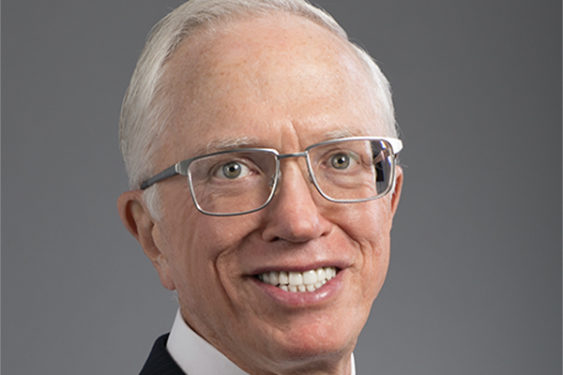
By Kurt Jensen
WASHINGTON (Catholic News Service) — Stephen Auth is used to being taken seriously as a manager of mutual funds. In his work in street evangelism, though, he has learned new lessons in humility.
He’s executive vice president of Federated Global Investment Management Corp. in New York. His publicist provides numbers to document his success, somewhat like athletes provide statistics: Assets under management, $484.9 billion. Equity under management, $80.2 billion.
That amount of clout enables him to frequently appear on finance shows, and he’s developed a skill at a delivery calm enough not to upset the stock market during trading hours. A cable TV carnival barker he’s not, and he’s never been in sales, either, he observed in an interview with Catholic News Service.
“I don’t do sales. I’m kind of an intellectual guy — an introvert.”
For the past 10 years, he has gotten outside his comfort zone to do sidewalk evangelism at St. Patrick’s Old Cathedral on Mulberry Street in New York City. That effort began during Holy Week and Advent and has recently expanded to certain weeks in “all four seasons.”
He knows that the density of downtown pedestrian traffic there isn’t duplicated in other cities — “Well, maybe Dublin,” he offered, after considering the idea.
But the lessons learned in his evangelistic work can be applied anywhere, he added, and it’s not entirely a separate skill set from what he does in business. “Maybe this is a Wall Street skill. My role as a leader is to get people into roles where they can be successful.”
Sidewalk evangelism has been a series of teaching moments for Auth, who’s put what he’s learned in a new book, “The Missionary of Wall Street,” published by Sophia Institute Press. He describes a series of encounters to point out techniques, such as the importance of direct eye contact and a comforting tone of voice.
“If nothing else, I hope this story inspires people of faith to be a little bit braver.”
The evangelistic effort involves volunteers working in teams.
The “hot corner” team is outside with rosaries near the front door of the church, and inside are teams for prayer, candles to light before the Blessed Sacrament, and a team to lead people to either the candle team or a priest.
“We find that, once they’re inside, even souls who came into the church only to light a candle and pray are often moved by the Holy Spirit to want more,” Auth writes. “They are too embarrassed to go directly to confession but will often do so gladly when invited gently.”
Team members wear jeans, sneakers and a Regnum Christi mission shirt emblazoned with an image of Christ on the cross and the words “Be Not Afraid.” This, he writes, “helps us stand out in the crowd and signals to a passerby that this is not likely to be a casual encounter with a random street hawker.”
“If pedestrians ignore one team, they’re likely to encounter another, which reinforces the message. More numbers: More than 1,000 lay missionaries have greeted more than 3 million people and estimate about 15,000 have been brought back to church.
“Our ultimate goal is to get people to the sacrament of confession,” Auth says. “To have a converting experience to help their soul for eternity.”
“It often happens that, even when souls have politely passed by with a ‘not interested’ or maybe even no word at all, the Holy Spirit has already entered their hearts, and they’re thinking about the possibility. Later, if the net is formed properly, they’ll run into a second team, and they’re often more open to talking by then,” Auth writes.
In 2002, Auth experienced a heart stoppage, and the brush with death revived his Catholic faith, leading, he says, to his first confession in his adult life. “I was a Sunday Catholic, but I didn’t have a deep love of Jesus in my heart,” he said. The sidewalk evangelism began in the wake of the 2008 economic crisis.
“I think the culture is becoming more godless, and I don’t think that’s making anyone happy,” Auth said. “The rest of the world is living outside the walls, pursuing a lifestyle they were told would make them happy.”
Lest anyone think his effort is a rich man’s dilettantism, Auth points out that he didn’t come from money.
He grew up in Newark, New Jersey, where his father was a steamfitter, and he attended Princeton University on a scholarship. He’s a member of the Regnum Christi movement and on the national board of the Lumen Institute, a faith formation for executives which he helped found in New York.
“The habit of joyful perseverance,” he writes, reinforced with prayer, is the key to successful evangelism.
“When you’re armed with rosaries, it’s a little disconcerting to people,” Auth concedes. “The real danger to missionaries on the streets is psychological — a lot of abuse. You need to speak to 40 people before you can find one who will talk to you.”
“Auth has discovered many of the same truths that we have discovered as an apostolate,” said Adam Janke, CEO of the Michigan-based St. Paul Evangelization Institute. “Mary leads us to Jesus, and the rosary, as a familiar cultural icon, gives people a tangible reminder of God’s love for them.”
Steve Dawson, president and founder of the institute, said: “Auth’s method of building trust, finding common ground, sharing the Gospel and calling people to examine their conscience is exactly what we have found to be fruitful in street ministry. We have hundreds of street teams throughout the country that go out in groups of two or more and evangelize using rosaries, miraculous medals, and other tools. It has helped me become a more effective evangelist in everyday life.”
“I’m not quite so prideful to think I can change the culture,” Auth said. “The way the Lord converted people was one at a time.”
